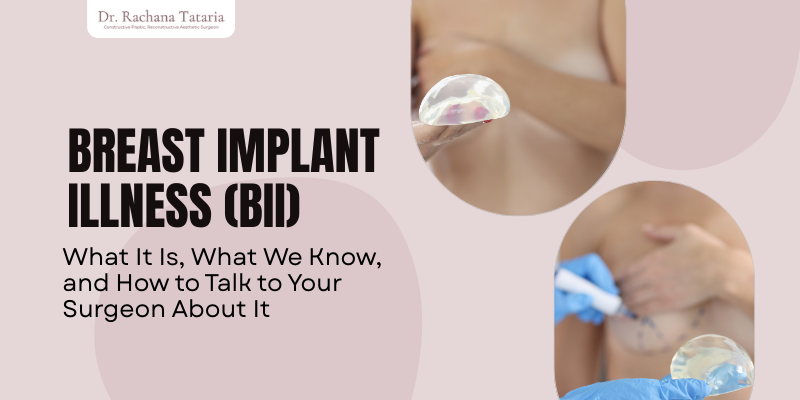For many women, breast implants boost confidence, restore body shape after surgery, or simply help achieve a long-desired change. But in recent years, a growing number of women have spoken about something called Breast Implant Illness (BII). While it is not yet an official medical diagnosis, BII has become a serious and widely discussed concern in both medical and patient communities.
What Is Breast Implant Illness?
Breast Implant Illness is a broad term used to describe a range of physical and emotional symptoms that some women link to their breast implants. It can occur in those with both saline and silicone implants, regardless of whether the implants are placed for cosmetic augmentation or breast reconstruction.
Symptoms may appear within months of surgery or years later. The condition isn’t fully understood, but women’s consistent reports have drawn attention from researchers and surgeons worldwide.
BII Symptoms and Causes – What Patients Report
The most reported symptoms of Breast Implant Illness (BII) include:
Persistent fatigue or lack of energy
Brain fog, poor concentration, or memory lapses
Joint stiffness or unexplained muscle aches
Low mood, anxiety, or depression
Rashes, hair thinning, or other skin problems
Sleep disturbances or chest tightness
These symptoms can sometimes mimic autoimmune conditions, making diagnosis challenging. As for the causes, several theories exist:
The immune system is reacting to the implant as a foreign object
Leakage of silicone or release of chemicals from the implant shell
Low-grade bacterial infection around the implant
A trigger of autoimmune reactions in susceptible individuals
While there is no single proven cause yet, ongoing research continues to explore these links.
How Rare Is Breast Implant Illness?
It’s important to note that not every woman with breast implants develops BII. Millions of women worldwide have implants and do not experience major health problems. However, for the group of women who do face these symptoms, the impact can be life-changing.
The exact frequency is still unknown, but awareness has grown significantly. The medical community now recognises the importance of listening to patients and taking their concerns seriously.
If you notice any of these, consult a qualified surgeon promptly.
Monitoring Implant Health
For women with silicone implants, regular MRI or ultrasound scans are often recommended every few years to detect silent ruptures. Even without visible problems, check-ups with a breast implant replacement Mumbai specialist ensure long-term safety.
Maintaining open communication with your surgeon is key. Someone like Dr Rachana Tataria, an experienced breast surgeon, can guide you on whether your implants are functioning well or if replacement is advisable.
Can Breast Implant Illness Be Reversed?
A common question is: If implants are removed, will symptoms go away?
Many women do notice improvement after explant surgery (removal of implants, sometimes with the surrounding scar tissue capsule). For some, symptoms improve dramatically within weeks. Others report gradual changes, and a few continue to experience lingering issues.
This variation means expectations should remain realistic. Implant removal can help, but it may not always provide a complete solution. Still, for many women, explant surgery feels like the right step toward better health and peace of mind.
Talking to Your Surgeon About BII
Discussing BII with your surgeon can feel overwhelming, but open communication is key. Here are some practical steps:
Track your symptoms
note when they began, how often they occur, and whether they are worsening.
Ask direct questions
for example, “Could my implants be connected to these health problems?”
Explore options
your surgeon can guide you through tests, monitoring, or implant removal if needed.
Seek experience
consulting a BII-aware surgeon in Mumbai ensures you receive the latest, balanced information.
Plastic surgeons like Dr Rachana Tataria, who regularly counsel women about BII symptoms and causes, can help you navigate this sensitive decision with both medical facts and empathy.
What are the most reported symptoms of Breast Implant Illness (BII)?
The most common symptoms include fatigue, brain fog, mood swings, muscle and joint pain, skin rashes, and sleep problems. These vary widely between individuals and may take years to appear.
How should I bring up BII with my plastic surgeon?
Start by sharing your symptom history clearly. Don’t hesitate to express your concerns about a possible link to implants. A supportive surgeon will listen, review current evidence with you, and guide you on next steps, whether that means monitoring or considering implant removal.
Final Thoughts
Breast Implant Illness is still being studied, but what matters most is how you feel. If you have implants and notice unexplained health issues, don’t dismiss your concerns. Instead, consult a surgeon who understands breast implant illness, its symptoms, and the available solutions.
Your health and peace of mind should always come first. With the right support, you can make decisions that safeguard both your well-being and your confidence.

